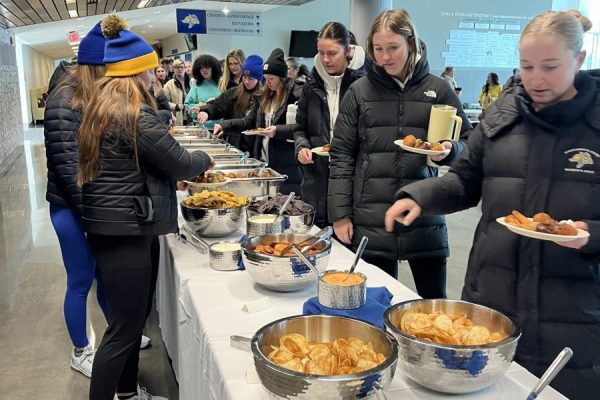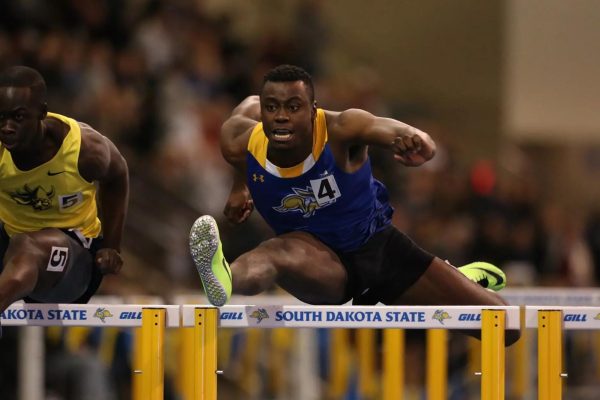Somebody’s (not) watching…
October 28, 2002
Tammie TamaraSection Editor
The rumors that the higher-ups on campus are watching what you download or reading your e-mail as you surf online are nothing more than just that?rumors.
What is monitored, however, is bandwidth.
“If you get someone who is dumping down a lot of tunes, they take up bandwidth space, and that’s a real issue,” said Allan Jones, director of Information Technology Services.
“It was a huge problem, particularly when Napster was at its highest.”
But since last spring, when SDSU installed Packeteer, ITS can apportion bandwidth space appropriately among students and other campus users, like faculty, library services and researchers. Packeteer is a “little black box,” Jones said.
“It just looks at the quantity of ones and zeros going across the network. We’ve discovered that it stays at a certain level.”
The whole campus has about 40 megabytes of bandwidth space to work with, he said. Students receive about seven of those megabytes, the equivalent of a T1 line for each of the residence halls.
Each hall and each college is on a VLAN, which Jones described as “containers, if you will. We can see which container is too full and which is not so full, so no one place is shorted. With Packeteer, we are able to control the data flow from all parts of campus and make sure it is equitable.”
Distance education classes require a good deal of bandwidth space. ITS is responsible for making sure the classes receive enough bandwidth to broadcast.
“If we have to crank back on someone downloading the latest U2 album, so be it,” he said.
Jones emphasized that Packeteer looks only at data flow.
“We do not do any content examination for any reason,” he said.
With regard to flow, the ITS staff keeps an eye on how much is being used.
If need be, they can pinpoint the computer using it. “If we see more than seven megabytes of VLAN coming out, it raises an alarm and we go check that out.”
Many times, the reason for using so much bandwidth is perfectly legitimate, like students downloading a large PowerPoint file for a class, for example. Jones said he is pleased with students’ behavior online, saying for the most part they have not abused their privileges.
“Students here at SDSU are very good. I have nothing but high praise for them.”
Guidelines for using technology on campus can be found in the Student Handbook.
“If they’ll stick with the acceptable use guidelines, they’ll have no problems,” Jones said.
When it comes to downloading music, the line between legal and illegal fades to gray.
“Technically it’s illegal, but everybody does it,” Jones said.
“This is an issue that affects all universities across the nation. It’s an issue that we as technicians try to determine, what is worth the effort to go pounding on the door?”
Peer-to-peer downloading is a gray area. However, some areas are not so shady, such as illegal downloading processes.
“There are a few cases where students are downloading movies illegally,” he said.
Complaints are directed toward Dean of Libraries Steve Marquardt, SDSU’s copyright officer.
“If he’s ever contacted on a situation like this, we are obligated to do something about it, Jones said”
Only then, though, does campus get involved in content issues, and they carry out only the instructions given to them by police. Marquardt said they had one student last year downloading movies illegally.
“We haven’t had too much complaining about that,” he said. “We do have the authority to remove that from people’s computers.” Students have not been suspended or charged for having the material, he said.
Marquardt’s position as copyright officer stems from the Digital Millennium Copyright Act of 1999 requiring institutions to establish someone to receive complaints in order to be exempt from liability for piracy.
Though downloading music falls into the piracy category, it is a relatively tame violation.
“Taking pirated material is kind of a small thing,” he said. “The big thing is if you take that pirated information and start selling it.”
Though the Internet offers free music, Marquardt prefers not to download his music. “Personally, I still like to buy the CDs legitimately for quality reasons as well as legal reasons,” he said.
For a lot of students, however, this is not always the case.
“I haven’t bought a CD in over a year,” said sophomore art major Darla Milda. “Why should I?”
She uses the Internet for email, research and homework, but “mainly I just download music. Whatever I want, usually just certain songs.”
She is not concerned about legalities. “I don’t think it’s a very big deal. I don’t know many people who really worry about it.”
Senior pharmacy major Ryan Dominiack agreed. “I’m not worried about it.
Everybody does it,” he said. “We download music, music videos, cartoons, lots of good stuff.”
Sophomore April Hetle, a radio, TV and film major, said she doesn’t worry either, because she isn’t selling anything she downloads.
“Just about everybody and their mother is guilty of downloading, so getting caught would be pretty easy,” she said. “I don’t sell or make a profit off of anything I download, so I don’t see why it’s such a big deal.”
She downloads everything from TV shows to music to movies. Some of her downloading is for academic purposes, like for her Blues, Jazz and Rock class.
“A good portion of





















